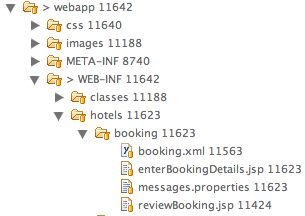Use the view-state element to define a step of the flow that renders a view and waits for a user event to resume:
<view-state id="enterBookingDetails"> <transition on="submit" to="reviewBooking" /> </view-state>
By convention, a view-state maps its id to a view template in the directory where the flow is located.
For example, the state above might render /WEB-INF/hotels/booking/enterBookingDetails.xhtml
if the flow itself was located in the /WEB-INF/hotels/booking directory.
Below is a sample directory structure showing views and other resources like message bundles co-located with their flow definition:

Flow Packaging